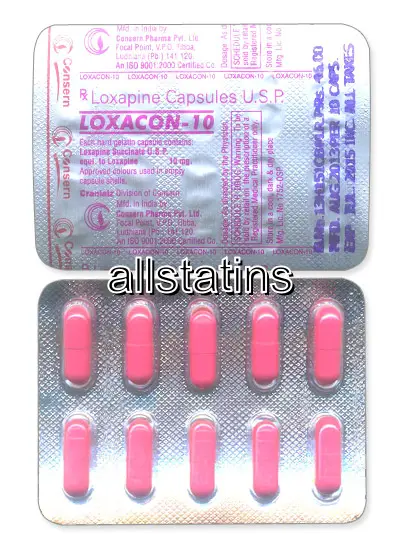| Package | Dosage | Price | Price per Dose | |
|---|---|---|---|---|
| Dosage: 10mg | ||||
| 360 pill | 10mg | NZD990.02 | NZD2.75 | |
| 180 pill | 10mg | NZD538.37 | NZD2.99 | |
| 120 pill | 10mg | NZD397.79 | NZD3.32 | |
| 90 pill | 10mg | NZD320.02 | NZD3.56 | |
| 60 pill | 10mg | NZD230.28 | NZD3.83 | |
| 30 pill | 10mg | NZD134.57 | NZD4.49 | |
| Dosage: 25mg | ||||
| 360 pill | 25mg | NZD1,411.77 | NZD3.92 | |
| 180 pill | 25mg | NZD792.61 | NZD4.40 | |
| 120 pill | 25mg | NZD598.19 | NZD5.00 | |
| 90 pill | 25mg | NZD487.52 | NZD5.41 | |
| 60 pill | 25mg | NZD355.91 | NZD5.92 | |
| 30 pill | 25mg | NZD209.35 | NZD6.97 | |

Loxapine Description
Overview of Loxapine
Loxapine is a medication primarily used to treat schizophrenia and other related psychotic disorders. It belongs to a class of drugs known as typical antipsychotics, which work by affecting certain chemicals in the brain that help in managing symptoms such as hallucinations, delusions, and disorganized thinking. Loxapine has been in use for many years and is well-established within psychiatric treatment options.
How Loxapine Works
The primary mechanism of action of Loxapine involves blocking dopamine receptors in the brain. Dopamine is a neurotransmitter involved in mood, perception, and behavior. By inhibiting dopamine activity, Loxapine helps reduce hallucinations and delusional thinking. Additionally, it also influences other neurotransmitters such as serotonin and norepinephrine, which may contribute to its therapeutic effects and side-effect profile.
Administration and Dosage
Loxapine is typically administered as oral tablets or in some cases via inhalation. The dosage depends on the severity of the condition, the patient’s response, and their overall health status. It is usually started at a lower dose to minimize side effects and gradually increased as needed. Patients should follow the prescribing instructions carefully and not adjust the dose without consulting a healthcare professional.
Effectiveness and Patient Feedback
Many patients report that Loxapine effectively alleviates symptoms of psychosis, allowing them to regain better control over their thoughts and perceptions. It is often considered a reliable option for managing severe mental health episodes. However, as with all medications, individual responses vary. Some patients find rapid symptom relief, while others may require adjustments in dosage or additional therapies for optimal results.
Potential Side Effects
Despite its benefits, Loxapine can cause side effects in some individuals. Common adverse effects include drowsiness, dry mouth, dizziness, and weight changes. More serious reactions may involve extrapyramidal symptoms such as tremors or stiffness, and metabolic disturbances like elevated blood sugar or cholesterol. Rare cases of allergic reactions or blood dyscrasias have been reported, which necessitate medical attention.
Precautions and Interactions
Before starting Loxapine, patients should inform their healthcare provider about any other medications they are taking or underlying health conditions. It has potential interactions with drugs such as antidepressants, other antipsychotics, and certain medications affecting heart rhythm. Individuals with a history of cardiac issues, liver problems, or seizures should be closely monitored during treatment. Pregnant and breastfeeding women should discuss potential risks and benefits with their doctor.
Final Thoughts
Loxapine remains a valuable option in the management of psychotic disorders. Its effectiveness in controlling symptoms makes it a preferred choice for many patients and clinicians. However, careful supervision is essential to minimize side effects and ensure the best therapeutic outcomes. Patients on Loxapine should maintain regular follow-up appointments to monitor progress and address any concerns that may arise during treatment.
